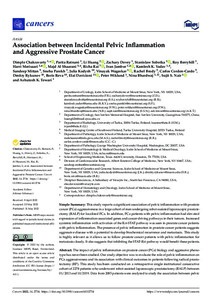Association between Incidental Pelvic Inflammation and Aggressive Prostate Cancer
Chakravarty Dimple; Ratnani Parita; Huang Li; Dovey Zachary; Sobotka Stanislaw; Berryhill Roy; Merisaari Harri; Al Shaarani Majd; Rai Richa; Jambor Ivan; Yadav Kamlesh K.; Mittan Sandeep; Parekh Sneha; Kodysh Julia; Wagaskar Vinayak; Brody Rachel; Cordon-Cardo Carlos; Rykunov Dmitry; Reva Boris; Davicioni Elai; Wiklund Peter; Bhardwaj Nina; Nair Sujit S.; Tewari Ashutosh K.
https://urn.fi/URN:NBN:fi-fe2022081155008
Tiivistelmä
The impact of pelvic inflammation on prostate cancer (PCa) biology and aggressive phenotype has never been studied. Our study objective was to evaluate the role of pelvic inflammation on PCa aggressiveness and its association with clinical outcomes in patients following radical prostatectomy (RP). This study has been conducted on a retrospective single-institutional consecutive cohort of 2278 patients who underwent robot-assisted laparoscopic prostatectomy (RALP) between 01/2013 and 10/2019. Data from 2085 patients were analyzed to study the association between pelvic inflammation and adverse pathology (AP), defined as Gleason Grade Group (GGG) > 2 and ≥ pT3 stage, at resection. In a subset of 1997 patients, the association between pelvic inflammation and biochemical recurrence (BCR) was studied. Alteration in tumor transcriptome and inflammatory markers in patients with and without pelvic inflammation were studied using microarray analysis, immunohistochemistry, and culture supernatants derived from inflamed sites used in functional assays. Changes in blood inflammatory markers in the study cohort were analyzed by O-link. In univariate analyses, pelvic inflammation emerged as a significant predictor of AP. Multivariate cox proportional-hazards regression analyses showed that high pelvic inflammation with pT3 stage and positive surgical margins significantly affected the time to BCR (p ≤ 0.05). PCa patients with high inflammation had elevated levels of pro-inflammatory cytokines in their tissues and in blood. Genes involved in epithelial-to-mesenchymal transition (EMT) and DNA damage response were upregulated in patients with pelvic inflammation. Attenuation of STAT and IL-6 signaling decreased tumor driving properties of conditioned medium from inflamed sites. Pelvic inflammation exacerbates the progression of prostate cancer and drives an aggressive phenotype.
Kokoelmat
- Rinnakkaistallenteet [29337]
